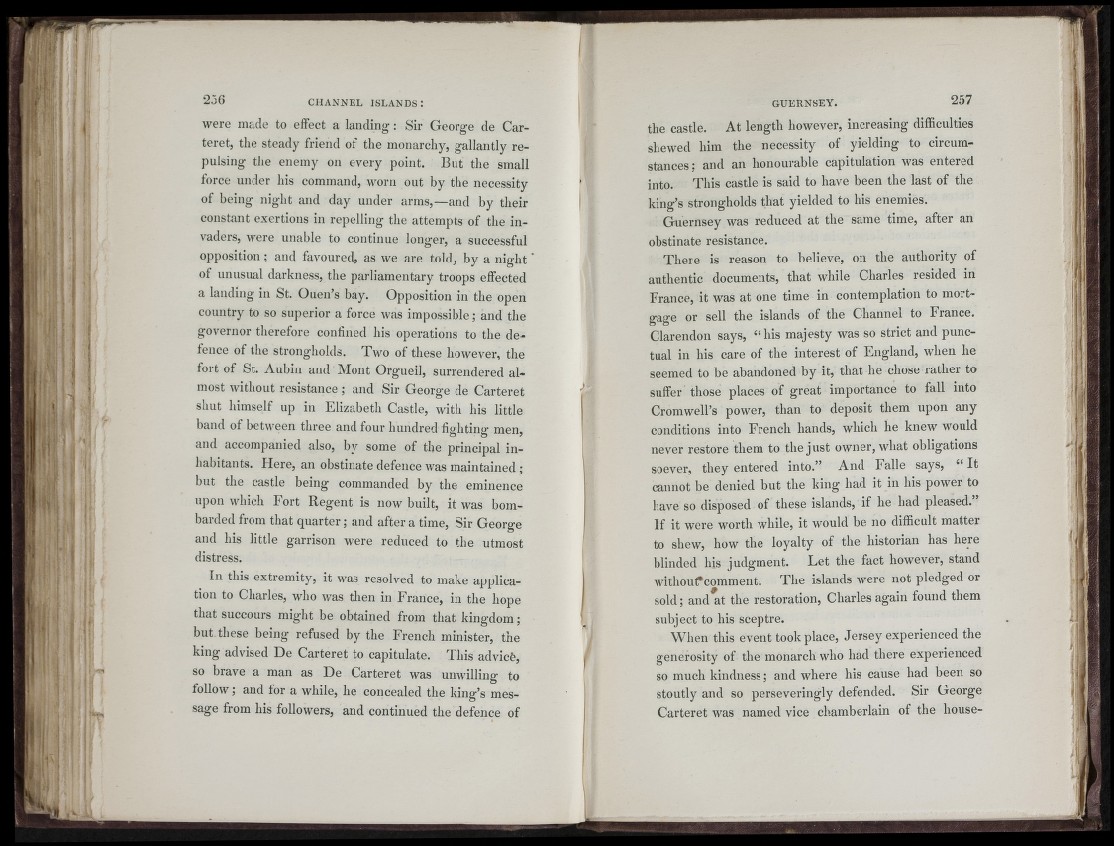
A n f
were made to effect a landing: Sir George de Carteret,
the steady friend of the monarchy, gallantly repulsing
the enemy on every point. But the small
force under his command, worn out by the necessity
of being night and day under arms,—and by their
constant exertions in repelling the attempts of the invaders,
were unable to continue longer, a successful
opposition; and favoured, as we are told, by a n ig h t'
of unusual darkness, the parliamentary troops effected
a landing in St. Ouen’s bay. Opposition in the open
country to so superior a force was impossible; and the
governor therefore confined his operations to the defence
of the strongholds. Two of tliese however, the
fort of St. Aubin and Mont Orgueil, surrendered almost
without resistance ; and Sir George de Carteret
shut himself up in Elizabeth Castle, with his little
band of between three and four hundred fighting men,
and accompanied also, by some of the principal inhabitants.
Here, an obstinate defence was maintained;
but the castle being commanded by the eminence
upon whicli Fort Regent is now built, it was bombarded
from that quarter; and after a time. Sir George
and his little garrison were reduced to the utmost
distress.
In this extremity, it was resolved to make application
to Charles, who was then in France, in the hope
that succours might be obtained from that kingdom;
but these being refused by the French minister, the
king advised De Carteret to capitulate. This advic&,
so brave a man as De Carteret was unwilling to
follow; and for a while, he concealed the king’s message
from his followers, and continued the defence of
the castle. At length however, increasing difficulties
shewed him the necessity of yielding to circumstances:
and an honourable capitulation was entered
into. This castle is said to have been the last of the
king’s strongholds that yielded to his enemies.
Guernsey was reduced at the same time, after an
obstinate resistance.
There is reason to believe, on the authority of
authentic documents, that while Charles resided m
France, it was at one time in contemplation to mortgage
or sell the islands of the Channel to France.
Clarendon says, “ his majesty was so strict and punctual
in his care of the interest of England, when he
seemed to be abandoned by it, that he chose rather to
suffer those places of great importance to fall into
Cromwell’s power, than to deposit them upon any
conditions into French hands, which he knew would
never restore them to the just owner, what obligations
soever, they entered into.” And Falle says, “ It
cannot be denied but the king had it in his power to
have so disposed of these islands, if he had pleased.
If it were worth while, it would be no difficult matter
to shew, how the loyalty of the historian has here
blinded his judgment. Let the fact however, stand
witliourcomment. The islands were not pledged or
sold; and^t the restoration, Charles again found them
subject to his sceptre.
When this event took place, Jersey experienced the
generosity of the monarch who had there experienced
so much kindness; and where his cause had been so
stoutly and so perseveringly defended. Sir George
Carteret was named vice chamberlain of the housei
i ■
! } • M
iC
it Ml
Ji.'
li
' 3 r
1
'm
'-.•3 I
4
i ~
fLj":' iJ--f ' -j' M/